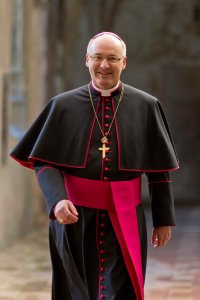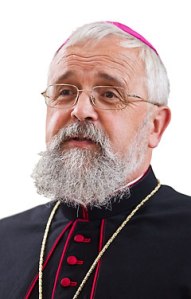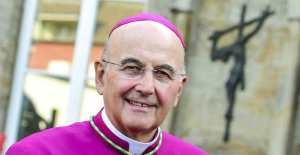In two days’ time, on Thursday 3 May, the much anticipated meeting between representatives of the German episcopate and the heads of several Holy See dicasteries will take place, to discuss the question of Communion for non-Catholics. In February, the majority of German bishops voted in favour of devising a pastoral approach in which non-Catholic spouses of Catholic faithful could receive Holy Communion alongside their partner in certain specific cases. Seven German bishops then wrote to the Holy See to find out if this is a decision that could be taken by a bishops’ conference on its own, or if it involved doctrine and Church unity to such an extent that it is something best left to Rome.
Originally, the invitation for the meeting was extended to Cardinals Reinhard Marx and Rainer Maria Woelki, as well as Bishop Felix Genn, with Woelki as the sole representative of the bishops who signed the letter to Rome. Marx was included as president of the bishops’ conference, while Bishop Genn remains uncertain as to why he was invited. He doesn’t believe it is because of his membership of the Congregation for Bishops, though. Joining these three are Bishops Karl-Heinz Wiesemann and Rudolf Voderholzer, president and vice-president of the doctrinal commission of the German Bishops’ Conference; Bishop Gerhard Feige, president of the ecumenism commission; and Fr. Hans Langendörfer, secretary general of the bishops’ conference. The Roman side of the discussion will consist of Archbishop Luis Ladaria Ferrer, prefect of the Congregation for the Doctrine of the Faith; Cardinal Kurt Koch, president of the Pontifical Council for Promoting Christian Unity; Msgr. Markus Graulich, undersecretary of the Pontifical Council for Legislative Texts; and Fr. Hermann Geissler, office head of the doctrinal section of the Congregation for the Doctrine of the Faith. A team with a heavy focus on doctrinal and legislative expertise, then.
The inclusion of Bishop Voderholzer means that Cardinal Woelki is not the only prelate in the delegation who expressed reservations about the issue. In a recent interview, the bishop of Regensburg explained his reasoning for signing the letter to Rome:
 “Let me say two things in advance: I consider ecumenism as a fundamental mission from Christ Himself. In the Gospel of John, Christ prays to the Father, “that they may be one, as we are one… that they may be brought to perfection as one, that the world may know that you sent me” (John 17: 22b, 23). We must remain true to this fundamental mission of Christ. It’s not a matter of ecumenism yes or no, but of the path of ecumenism, the path to unity. We all yearn for this unity – as do I!
“Let me say two things in advance: I consider ecumenism as a fundamental mission from Christ Himself. In the Gospel of John, Christ prays to the Father, “that they may be one, as we are one… that they may be brought to perfection as one, that the world may know that you sent me” (John 17: 22b, 23). We must remain true to this fundamental mission of Christ. It’s not a matter of ecumenism yes or no, but of the path of ecumenism, the path to unity. We all yearn for this unity – as do I!
Allow me to add another thing: I am aware of the needs and problems which occur in the education of children in confessional marriages, but also in the religious lives of the spouses. I am also aware of the tensions which come from this and which can be hurtful. I know this from conversations with people in these situations and also from my family. I take that with me as bishop.
The point of the letter which I have written with my brother bishops is to find a way which takes the needs of people seriously and which at the same time provides assistance. We are, however, of the opinion that the pastoral “outreach” sought for by the majority of the bishops’ conference, which allows evangelical spouses to receive Communion, does not resolve these problems and needs. It also does not do justice to the meaning of the sacrament of the Eucharist in the Catholic Church. Furthermore, the “outreach” does not sufficiently take into account the different understandings of the various confessions regarding the Eucharist on the one hand, and the Last Supper on the other.
In the question of ecumenism we must, lastly, also take the views of the eastern churches into account. They regard the bond between Church community and Eucharistic community even deeper than in the western churches. When the Catholic Church hides this view, she significantly deepens the split with the orthodox churches.”
 Opposing the actions of the seven bishops is Bishop Gerhard Feige, bishop of Magdeburg and president of the ecumenism commission of the German Bishops’ Conference. In a contribution to Der Zeit last Thursday, Msgr. Feige stated that not taking the chance to help people deepen the joy of the faith and their participation in the Eucharist, as well as promoting ecumenical encounters and strengthening the marriage bond would be “macabre and shameful”. Contrary to other bishops, Msgr. Feige insists that the pastoral outreach exists within modern theological and legal possibilities, referring to the canon law paragraphs which allow local bishops to decide under which circumstances non-Catholic can receive Communion. These circumstances, however, are emergency situations in which the danger of death and the unavailability of ministers of a person’s own denomination play key roles.
Opposing the actions of the seven bishops is Bishop Gerhard Feige, bishop of Magdeburg and president of the ecumenism commission of the German Bishops’ Conference. In a contribution to Der Zeit last Thursday, Msgr. Feige stated that not taking the chance to help people deepen the joy of the faith and their participation in the Eucharist, as well as promoting ecumenical encounters and strengthening the marriage bond would be “macabre and shameful”. Contrary to other bishops, Msgr. Feige insists that the pastoral outreach exists within modern theological and legal possibilities, referring to the canon law paragraphs which allow local bishops to decide under which circumstances non-Catholic can receive Communion. These circumstances, however, are emergency situations in which the danger of death and the unavailability of ministers of a person’s own denomination play key roles.
Bishop Feige, who, as mentioned above, will also travel to Rome on Thursday, also expressed strong criticism against the seven bishops who wrote to Rome. He describes his impression
“that the labourious search for a responsible pastoral solution for individuals did not determine their interest, but rather the fundamental fear of not being truly Catholic anymore. Some still seem to be attached to a pre-Conciliar image of the Church and have little internalised the Catholic principles of ecumenism.”
With these words, Bishop Feige seems to be the one who is rather set in his ways, and it hard to see how such an attitude towards his brother bishops will be helpful in Thursday meeting.
 Münster’s Bishop Felix Genn is hopeful of finding a consensus. While the way in which the seven bishops expressed their difficulties with the conference’s vote did not make him happy, he understands their questions of conscience. In an interview for WDR radio Bishop Genn expressed his happiness about the way in which the standing council of the bishops’ conference discussed the issue last week. And although he would have preferred that the seven bishops had first informed the others about their letter before sending it, Bishop Genn’s attitude is perhaps the most consensus-minded in the delegation, which may be a reason for his inclusion. The bishop, for his part, simply thought of his mother’s motto when hearing about being included in the delegation: “One has never got enough work to do.”
Münster’s Bishop Felix Genn is hopeful of finding a consensus. While the way in which the seven bishops expressed their difficulties with the conference’s vote did not make him happy, he understands their questions of conscience. In an interview for WDR radio Bishop Genn expressed his happiness about the way in which the standing council of the bishops’ conference discussed the issue last week. And although he would have preferred that the seven bishops had first informed the others about their letter before sending it, Bishop Genn’s attitude is perhaps the most consensus-minded in the delegation, which may be a reason for his inclusion. The bishop, for his part, simply thought of his mother’s motto when hearing about being included in the delegation: “One has never got enough work to do.”
Regardless of its outcome, Thursday’s meeting will not only be significant for the German bishops, but for the entire Church, and the entire ecumenical project. For the Congregation of the Doctrine of the Faith this will be the first major test under the new leadership of Archbishop Ladaria Ferrer. Likewise, the Pontifical Council for Legislative Texts, although represented by its undersecretary, has recently come under new leadership as Archbishop Filippo Iannone succeeded Cardinal Coccopalmerio as president in early April. The question of the role of doctrine and law in a papacy devoted in the first place to pastoral care and mercy will receive a resounding answer.